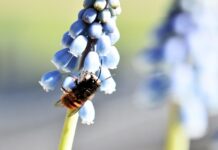The solemn observance of D-Day this year saw surviving veterans of that unbelievable moment in world history mark the moment. Numbers of those heroes still with us, though smaller with each passing year, deserve this light shining upon them.
Some, it is said, had to travel with a hospice nurse, and would return to a hospice home immediately following ceremonies to mark the solemn day that turned World War II toward a mighty win for democracy.
My father-in-law, Donald Sutherland, left his home and farm to serve in World War II. Asked if anyone in the large group of recruits played a musical instrument, he was puzzled by the question, but raised his arm. He could play the saxophone completely by ear, his mother a great piano teacher, so music was in his bones.
“I thought they were gonna stick me in the Navy band, and I had to figure how to tell them I couldn’t read music, but I could play just about anything after hearing it a time or two,” Don told me with a grin.
Turns out his music connection put him on sonar patrol on a rough-riding destroyer, the USS Holt. “I was so homesick and then learned the agony of seasickness, and it’s beyond description,” he told me.
After a lifetime of not mentioning much about his Navy days, one day, out of the blue, my father-in-law asked if I could type up something to give his sons for Christmas in 1996: putting his secretly-held journal from wartime into book form as a surprise gift.
Together we worked quietly on this project, pre-computer days, so my typewriter punched out his journal entries, often requiring me to call him at odd times out of earshot of my husband to clarify notations.
The first entry is dated Oct. 14, 1944, “We departed from New York to where, no one knows.” These are the words of a 21-year-old who had never had much desire to leave the family farm, who truly enjoyed the companionship of loving parents and three younger sisters. His words reflect thousands of young men just like him, willing to fight for democracy in unknown, unseen places.
He writes of crossing the Equator during his watch, getting his first mail in over a month, “30 letters!” and a short stay in New Guinea over Christmas and New Years Day, 1945. “Luzon was landed on by General MacArthur himself and a convoy of 800 vessels. The landing was successful.”
After time in the South China Sea, he notes on Jan. 21, 1945, “Arrived in the Gulf safely. Found them pounding the beach with plenty of Big Boys. Russians continue drive on in Germany. Capture Warsaw, allies capture Luxembourg. The Burma Road is opened. Started patrolling in entrance of Gulf.”
A momentous, grim day, Jan. 23: “Continued patrol at about 20:00 hours, we had a near miss from a Japanese Neil. Also a Japanese suicide job missed its mark (us) and went up in flames about 100 yards off our bow. At about 2100 hours, we discovered one of the Japanese fliers in the water. We were forced to do away with him before we brought him aboard because of possible casualties to crew of ship from a possible suicide job. I held the search light on him at the time.”
It became clear to me that my jovial father-in-law found all of this hard to think about, let alone discuss. But, he said, something had been prodding him to share this life experience with his six sons, and needed my help to do it. “I can’t explain it, but I think it’s time,” he said.
The finished gift was presented to his sons on Christmas Eve, 1996, each one surprised and amazed by it. Just six weeks later, after a typical day spent in the woods with our young son, splitting and cutting logs for firewood, my father-in-law died unexpectedly in his sleep. He was 73.
He taught us all so much, gave of himself with a happy heart wherever needed and I learned so much more about his generous spirit than I ever would have known without that tiny journal tucked away.
All of the young people who put their young lives on the line for not only our country but so many other democratic countries unfairly, unjustly under attack deserve praise that lives on forever. These are our true heroes. We dare not forget.













